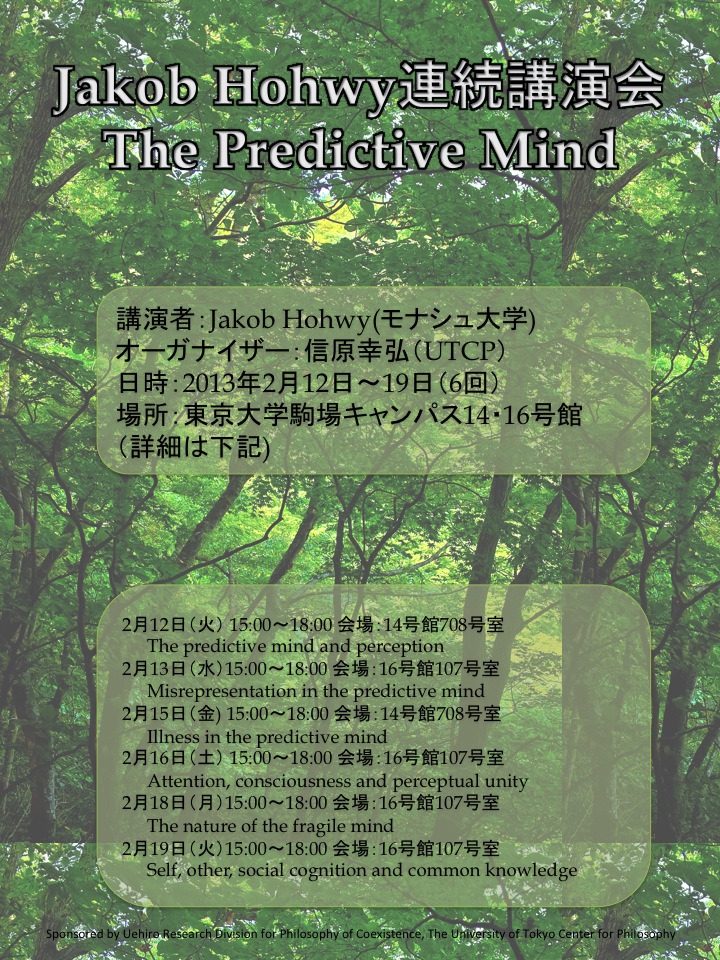
|
Title: | Jakob Hohwy連続講演会終了しました |
||
|---|---|---|---|---|
| Date: | 2013年2月12日〜19日(6日間) |
Place: | 東京大学駒場キャンパス14・16号館(詳細は下記) |
|
The Predictive Mind Lectures at Komaba
講演者:Jakob Hohwy
オーガナイザー:信原幸弘(UTCP)
(1) Feb 12 (Tue.) 15:00~18:00 Lecture and discussion
会場:14号館708号室
題目:The predictive mind and perception.
On a prediction error minimization scheme, a simple computational mechanism is replicated throughout the brain and explains perception, action and attention. This talk describes this mechanism, indicates why it is attractive, and explores the consequences of the scheme for two key problems in cognitive science and philosophy: binding and cognitive impenetrability. In both cases, plausible accounts transpire and we learn something new about how the mind structures its percepts and how our expectations and beliefs may shape our perception.
(2) Feb 13 (Wed.) 15:00~18:00 Lecture and discussion
会場:16号館107号室
題目:Misrepresentation in the predictive mind
The predictive mind framework begins with a simple idea of a neuronal, statistical mechanism. This simple mechanism can however be adjusted and tweaked in many different ways. I describe the mechanism in more detail and focus on the ways in which we can fail to represent the world correctly. I focus in particular on precision optimization (which will become relevant for mental illness, in the following lecture). I end this lecture by linking to the traditional debate in philosophy of language and mind about the possibility of misrepresentation.
(3) Feb 15 (Fri.) 15:00~18:00 Lecture and discussion
会場:14号館708号室
題目:Illness in the predictive mind
The mind is fundamentally the upshot of a predictive mechanism. This suggests that mental illness and developmental disorder should be understood as malfunctioning prediction error minimisation. But it is not obvious how disorders like autism and schizophrenia could emerge from the predictive mind. This talk approaches these issues in the light of autism. I suggest how a specific problem with prediction error minimisation could explain some sensory deficits in autism, I exemplify this with data from studies of sensory integration in autism, and I speculatively connect these ideas to the social deficits central to autism. I end by considering how this broad computational framework could in turn relate to aspects of delusion formation in schizophrenia, again illustrated with empirical findings.
(4) Feb 16 (Sat.) 15:00~18:00 Lecture and discussion
会場:16号館107号室
題目:Attention, consciousness and perceptual unity
This lecture connects the predictive mind to two debates in current consciousness science. The first debate concerns the relation between attention and consciousness. In the predictive mind, attention is precision optimization and this theoretical construct provides an attractive understanding of the relation between consciousness and attention. This idea is then illustrated with various empirical cases (e..g., inattentional blindness). The second debate concerns the unity of perceptual experience. Conscious perception is unified into one stream but this basic fact about us is difficult to explain within standard theories of consciousness. I argue that within a prediction error minimisation scheme unity can be explained, namely in terms of its notion of active inference. I end by speculating about the role of attention and unity in mental illness.
(5) Feb 18 (Mon.) 15:00~18:00 Lecture and discussion
会場:16号館107号室
題目:The nature of the fragile mind.
From the notion of the predictive mind emerges a conception of the mind as in a sense fragile and indirectly related to the world it represents. I explore this deep aspect of the mind, and look ahead to other aspects such as what the predictive mind account can say about emotions, introspection and, in particular, the privacy of mind.
(6) Feb 19 (Tue.) 15:00~18:00 Lecture and discussion
会場:16号館107号室
題目:Self, other, social cognition and common knowledge
Other minds are paradigmatically hidden causal states in the world. This immediately invites us to apply the predictive mind framework to mentalising. By the same reasoning, one’s own mind is a hidden cause in the world, which must also be accessed in perceptual inference. Accordingly, this talk sets out a Bayesian, inferential account of self-knowledge and mentalising. We do think there is something special about representing mental states rather than other kinds of hidden causes, and autism spectrum disorder suggests this too. The talk then explores the idea that what makes social cognition special is common knowledge. I present particular applications of common knowledge to social networks and discuss how they may be compromised. This is in turn used to discuss the role of common knowledge when social cognition is disrupted, such as in autism.







